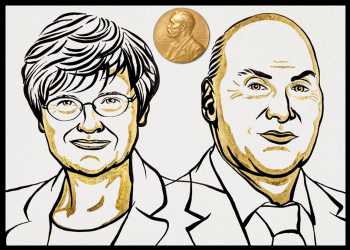Two scientists who developed the technology behind the mRNA Covid vaccines have won this year’s Nobel Prize in Medicine.
The Nobel Assembly at the Karolinska Institutet announced Monday that it decided to award the 2023 Nobel Prize in Physiology or Medicine jointly to Professors Katalin Kariko and Drew Weissman “for their discoveries concerning nucleoside base modifications that enabled the development of effective mRNA vaccines against COVID-19.”
The research partners will share the prize money of SEK 11 million ($1.007 million) equally.
The discoveries by the two Nobel Prize laureates were critical for developing effective mRNA vaccines against Covid-19 during the pandemic that began in early 2020. Through their groundbreaking findings, which have fundamentally changed our understanding of how mRNA interacts with our immune system, the laureates contributed to the unprecedented rate of vaccine development during one of the greatest threats to human health in modern times, the The Nobel Assembly said.
After the outbreak of the Covid-19 pandemic, two base-modified mRNA vaccines encoding the Sars-CoV-2 surface protein were developed at record speed. Protective effects of around 95 percent were reported, and both vaccines were approved as early as December 2020.
The impressive flexibility and speed with which mRNA vaccines can be developed pave the way for using the new platform also for vaccines against other infectious diseases. In the future, the technology may also be used to deliver therapeutic proteins and treat some cancer types.
Several other vaccines against Sars-CoV-2, based on different methodologies, were also rapidly introduced, and together, more than 13 billion Covid-19 vaccine doses have been given globally. The vaccines have saved millions of lives and prevented severe disease in many more, allowing societies to open and return to normal conditions. Through their fundamental discoveries of the importance of base modifications in mRNA, this year’s Nobel laureates critically contributed to this transformative development during one of the biggest health crises of modern history.
Kariko and Weissman published their research results in 2005, attracting little attention at the time, but later laid the foundation for critically important developments that served humanity during the coronavirus pandemic.
Born in Hungary in 1955, Katalin Kariko has been a Professor at Szeged University and an Adjunct Professor at Perelman School of Medicine at the University of Pennsylvania since 2021.
Drew Weissman was born in 1959 in Lexington, Massachusetts. In 1997, Weissman established his research group at the Perelman School of Medicine at the University of Pennsylvania. He is currently Professor in Vaccine Research and Director of the Penn Institute for RNA Innovations.
Source: Read Full Article
